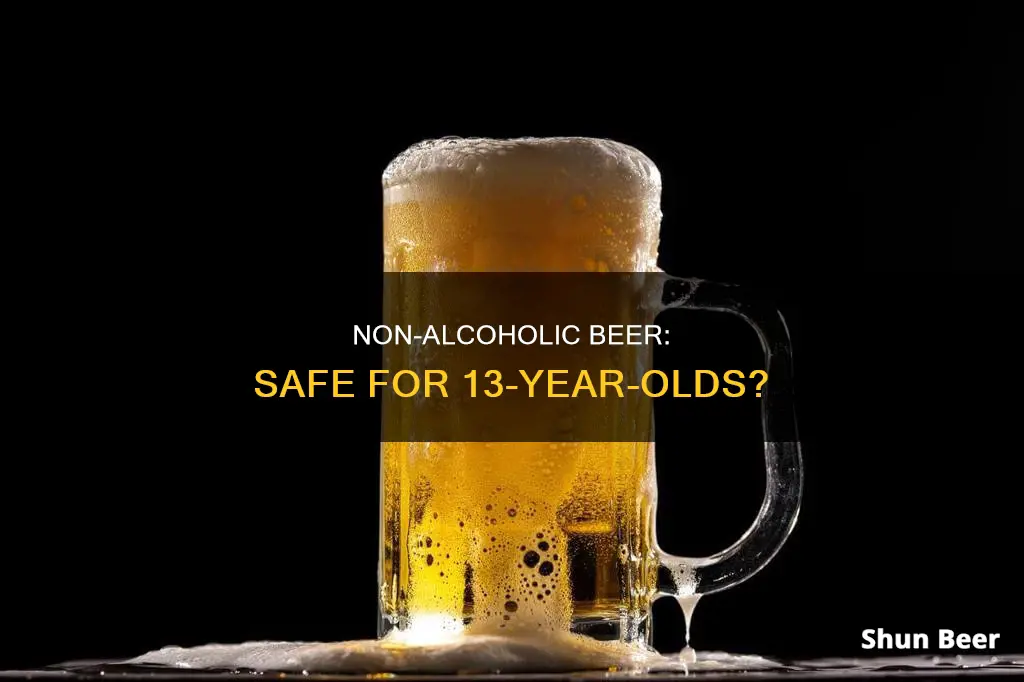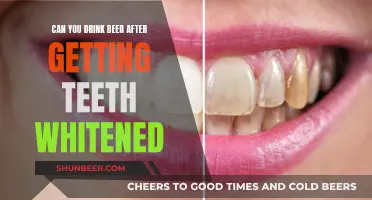
Non-alcoholic beer has become increasingly popular in recent years, with a growing market for adult non-alcoholic beverages. These drinks typically contain less than 0.5% alcohol by volume (ABV), which is significantly lower than the 4-6% ABV found in traditional beer. While non-alcoholic beer is generally considered a safer alternative to conventional beer, the question of whether it is suitable for minors, specifically those under the age of 13, remains a complex one. While the laws and regulations regarding the sale and consumption of non-alcoholic beverages vary across different states and countries, it is essential to consider the potential implications for minors.
What You'll Learn
- Non-alcoholic beer may contain a small amount of alcohol
- Minors drinking non-alcoholic beer is not allowed in some US states
- Minors drinking non-alcoholic beer is allowed in some US states with parental consent
- Non-alcoholic beer is subject to the same open container laws as alcoholic beer
- Non-alcoholic beer may be a gateway to drinking for kids

Non-alcoholic beer may contain a small amount of alcohol
Non-alcoholic beer is often marketed as a healthy alternative to alcoholic beer, and it can be a good option for people looking to reduce their alcohol intake. However, it's important to remember that non-alcoholic beer is not completely alcohol-free.
By law, non-alcoholic beers can contain up to 0.5% alcohol by volume (ABV). This means that while they have significantly less alcohol than regular beers, which typically range from 4-6% ABV, they do still contain a small amount. It's also worth noting that this 0.5% limit is not always accurate, and some non-alcoholic beers may contain higher levels of alcohol than advertised. One study found that 30% of non-alcoholic beers tested had more alcohol by volume than was indicated on their labels, with some containing up to 1.8% ABV.
The small amount of alcohol in non-alcoholic beer is due to the way it is made. Most non-alcoholic beer is produced by removing the alcohol from regular beer, usually through filtration or heating. However, it is difficult to remove all traces of alcohol, which is why some remains in the final product.
So, while non-alcoholic beer is not completely alcohol-free, the amount of alcohol it contains is very low. This means that it can be a good option for people who are looking to cut down on their alcohol consumption or are unable to drink alcohol for medical or personal reasons. However, it's important to be aware of the small amount of alcohol present, especially for people who are pregnant or have a history of alcohol abuse.
In the United States, the laws regarding the consumption of non-alcoholic beer by minors vary from state to state. Federally, minors under the age of 21 can consume non-alcoholic beverages, even those that contain up to 0.5% ABV. However, some states have their own regulations, with a few prohibiting minors from drinking non-alcoholic beer altogether. Therefore, it is important to check the local laws in your specific state to understand the legalities around minors consuming non-alcoholic beer.
Drinking Dr. McGillicudys Root Beer: Safe or Not?
You may want to see also

Minors drinking non-alcoholic beer is not allowed in some US states
In the United States, the legal drinking age is 21. However, this does not apply to non-alcoholic beverages, which are generally defined as drinks containing less than 0.5% alcohol by volume (ABV). While the federal government permits minors to consume non-alcoholic drinks, some US states have their own laws prohibiting minors from drinking non-alcoholic beer.
The National Minimum Drinking Age (NMDA) Act of 1984 defines "alcoholic beverage" as "beer, distilled spirits, and wine containing one-half of 1% or more of alcohol by volume." Therefore, non-alcoholic beer, which falls below this threshold, is not considered "beer" and can be consumed by minors—at least according to federal law.
However, individual states have the authority to set their own drinking age laws, and this is where it gets complicated. While each state has set the legal drinking age to 21, they differ in their definitions of "alcoholic beverage" and their rules regarding the purchase and consumption of non-alcoholic drinks by minors.
For example, in Mississippi, North Dakota, and Ohio, only those aged 18 and above are permitted to drink non-alcoholic beer. Additionally, 14 states, including Kansas, explicitly prohibit minors from consuming non-alcoholic beer. Kansas law, for instance, forbids the consumption of any "cereal malt beverage" that has undergone fermentation, which would include most non-alcoholic beers.
These variations in state laws highlight the importance of checking local regulations before allowing minors to consume non-alcoholic beer. While federal law may permit it, certain states have more restrictive policies in place.
The debate around minors and non-alcoholic beer is ongoing, with some health researchers advocating for clear and consistent age limits. They argue that non-alcoholic drinks could serve as a gateway to alcohol consumption for minors, mirroring concerns about candy cigarettes. However, others in the industry disagree, believing that self-regulation is sufficient and that government intervention is unnecessary.
Hines Park, Michigan: Beer Drinking Allowed?
You may want to see also

Minors drinking non-alcoholic beer is allowed in some US states with parental consent
In the United States, the laws surrounding minors drinking non-alcoholic beer are complex and vary from state to state. While the National Minimum Drinking Age Act of 1984 prohibits the sale of alcoholic beverages to those under 21, it does not specifically address non-alcoholic drinks. Non-alcoholic beer, typically defined as beer with less than 0.5% alcohol by volume (ABV), falls into a legal grey area.
In most states, there are no age restrictions on purchasing non-alcoholic beer, and minors are allowed to consume it with parental consent. However, there are exceptions, such as Mississippi, North Dakota, and Ohio, which only permit the consumption of non-alcoholic beer by those 18 and older. Additionally, 14 states, including Kansas, prohibit minors from drinking non-alcoholic beer altogether.
The laws regarding minors drinking non-alcoholic beer are subject to change and vary by state, so it is essential to check the specific regulations in your state. While non-alcoholic beer may be viewed as a safer alternative to conventional beer, some researchers argue that it could be a gateway to alcohol consumption for minors. Ultimately, the decision to allow minors to drink non-alcoholic beer rests with the parents or guardians, who must consider the potential risks and make an informed choice.
To clarify, a 13-year-old drinking non-alcoholic beer is allowed in some US states, but only with parental consent and supervision. It is essential to be aware of the specific laws and regulations in your state, as they may vary.
Beer and Diflucan: Is It Safe to Mix?
You may want to see also

Non-alcoholic beer is subject to the same open container laws as alcoholic beer
In the United States, the legal drinking age is 21. However, non-alcoholic beverages, such as non-alcoholic beer, are not bound by this restriction, and can be consumed by minors. Non-alcoholic beer typically contains less than 0.5% alcohol by volume (ABV), which is significantly lower than the amount found in traditional beer, which usually ranges from 4-6% ABV. Despite this, non-alcoholic beers are still regulated by the Federal Alcohol Administration Act (FAA), which does not indicate an ABV minimum.
The laws surrounding the purchase and consumption of non-alcoholic beer by minors vary from state to state. While some states allow minors to consume non-alcoholic beer with parental permission or in the presence of a parent or guardian, others have a minimum age limit of 18 for consumption. Additionally, a few states, such as Oregon, West Virginia, and Wyoming, prohibit the purchase of non-alcoholic beer by minors, considering it to be the same as alcoholic beer.
Regardless of the varying state laws, it is important to note that non-alcoholic beer is still subject to the same open container laws as alcoholic beer. For example, in Virginia, there is no law prohibiting passengers from having an open container of alcohol in a vehicle. However, the state's open container law applies specifically to the driver, making it illegal for them to consume alcohol while operating a motor vehicle. An "open container" is defined as any vessel containing an alcoholic beverage that is not in its originally sealed manufacturer's container. If a driver is found with an open container in their vehicle, they may face severe consequences, including a fine of up to $250.
Similar open container laws exist in other states as well, and they apply to both alcoholic and non-alcoholic beverages. This means that even if a minor is legally allowed to consume non-alcoholic beer in their state, they could still be in violation of the law if they are found with an open container in certain situations, such as in a vehicle or in a public place. Therefore, it is crucial for individuals to be aware of the specific open container laws in their state and to abide by them to avoid any legal repercussions.
Morning Beer: Should You Drink Before Work?
You may want to see also

Non-alcoholic beer may be a gateway to drinking for kids
Non-alcoholic beer is a divisive topic when it comes to minors, especially those under 18 or 21, depending on the country or state. While it is generally accepted that minors can consume non-alcoholic beverages, even those with trace amounts of alcohol (up to 0.5% ABV), there are concerns about the potential impact on their future drinking habits.
The Legality of Minors Consuming Non-Alcoholic Beer
In the United States, the National Minimum Drinking Age (NMDA) Act of 1984 defines "alcoholic beverage" as any beer, distilled spirit, or wine containing 0.5% or more alcohol by volume. Therefore, non-alcoholic beer, which typically has less than 0.5% ABV, is not considered "beer" under this federal definition and is legally consumable by minors under the age of 21. However, this varies by state, with some states, like Mississippi, North Dakota, and Ohio, only permitting non-alcoholic beer consumption for those 18 and older, and 14 states prohibiting minors from drinking non-alcoholic beer altogether.
The Potential Gateway Effect
Some researchers and health experts argue that non-alcoholic beer, wine, and mocktails could act as a gateway to drinking for kids. They liken these beverages to candy cigarettes, suggesting that they might normalize alcohol consumption for minors and increase their interest in trying the "real thing." A recent study from Japan found a greater interest in consuming alcohol among adolescents who consumed non-alcoholic beverages that mimicked alcohol. Additionally, the branding and marketing of these products by established alcohol companies may lead to brand familiarity and potentially increase the likelihood of future purchases of their alcoholic products.
Parental Concerns and Recommendations
Parents have mixed feelings about their children consuming non-alcoholic alternatives. Some are concerned that it might influence their children to want alcoholic drinks, while others are open to their teens trying these drinks, especially as they approach the legal drinking age. Experts recommend delaying the initiation of alcohol consumption as much as possible, as it can help reduce the risk of developing problematic drinking habits later in life. Dr. Amy Pennay, a senior research fellow from La Trobe University's Centre for Alcohol Policy Research, states that "giving young people anything that might potentially increase their interest in [alcohol] probably isn't a good idea."
Self-Regulation by Retailers
In the absence of clear age restrictions for non-alcoholic beverages, some retailers have taken it upon themselves to set their own age limits. For example, Darryl Collins, the owner of a zero-proof bottle shop in Maryland, chooses not to sell to anyone under 18, even though Maryland and most other states have no state age restrictions on the purchase of non-alcoholic drinks. This self-regulation is seen as a way to get ahead of a potential public health issue and prevent the normalization of alcohol consumption among minors.
Milk and Beer: Mixing Drinks, Safe or Not?
You may want to see also
Frequently asked questions
It depends on where they live. While non-alcoholic beer is not considered a "beer" under the National Minimum Drinking Age Act, which defines beer as a beverage containing more than 0.5% ABV, and is therefore not subject to the federal drinking age of 21, state laws vary. In Mississippi, North Dakota, and Ohio, for example, only those aged 18 and above are permitted to drink non-alcoholic beer, while 14 states prohibit minors from drinking it at all.
Non-alcoholic beer is similar to conventional beer in terms of its taste and how it's made. The main difference is that it doesn't contain alcohol, or at least, contains very little—up to 0.5% ABV.
No. While it is advertised as being "non-alcoholic", non-alcoholic beer is more accurately described as "low-alcoholic".
This depends on where they live. In some states, minors can't buy non-alcoholic beer, but in others, it isn't regulated. In Ohio, the minimum age to purchase non-alcoholic beer is 18.
No. Even if a 13-year-old is allowed to drink non-alcoholic beer in their state, they can't do so in a bar, pub, or club. They must be at their residence or on private property.







